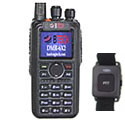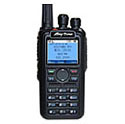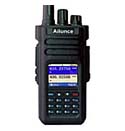Product Review
AnyTone D878UV II Plus
Dual Band
DMR Handheld
TDMA Tier I / II
VHF / UHF


FCC Part 90 T4K-D878UV
|
Anytone D878UV II Plus
The D878UV II Plus is both VHF and UHF, Tier II DMR digital as well as a FM analog with several additional features not found in similar appearing radios. In the Box Included with the radio are the: - Li-Ion Battery 3100 mAh - Belt clip - Hand Strap - User Guide – English - Charger base & AC adapter - Antenna – 6.25" (16cm) - Programming Cable - Earphone/Microphone - Bluetooth PTT (optional) General Description - DMR / FM - VHF / UHF Dual Band - Built in GPS - Size: 5.1 x 2.4 x 1.5" (129x61x39mm) - Weight: 9.9oz (282g) w/ant & battery - 140-174 400-480 MHz - CTCSS / DCS - DTMF / 2TONE / 5TONE - Analog / Digital APRS - 1w / 2w / 4w / 6w transmit - 4000 channel - 250 Zones (up to 250 channels per zone) - 10,000 contacts - File import / export via .csv files - 200K User DB Contacts (500K D878UV II+) - Bluetooth (D878UV Plus option) - FCC Part 90 certified T4K-D878UV Transmitter The frequency range of the D878UV II Plus is both VHF 136-174 and UHF 400-480 MHz. Along with DMR (12.5kHz), the radio also supports FM analog (12.5kHz and 25.0 kHz). Audio reports over the air were excellent. There is a five level microphone gain control that allows you to select the microphone gain level that best matches your voice. Level 3 (mid-level) gives a very smooth audio response. I tried level 5 and found the audio was way too hot, to the point of overload, so I highly advise against it. The radio holds true to its power specifications. Rated at 6W, the radios output levels were right on target on the ham bands into a calibrated Bird Termaline wattmeter.
Receiver and Audio The receiver sensitivity is very good on both digital and analog. I found the receive audio is smooth with a wide frequency range. The volume control range is adjustable with the software. Level 1 sets the full range of the volume control to a soft level, even at full volume. Level 8 sets the volume range to very loud at the top end. My preference is level 5 which is plenty loud, even for mobile operation. Enclosure The D878UV case has a good solid feel and weight, and fits the hand well. It weighs in at 9.9oz (282g) with the battery attached. Battery removal requires a simple push of the release slide located at the top of the battery. No sliding or battery pushing is required. I found the keypad buttons a bit larger than most with a keypad layout of three across and four down. This puts the zero (0) at the bottom of the keypad where I believe it belongs. The PTT button requires only a light pressure that doesn't tire the finger to press.
Antenna The included dual band antenna is 6.25" which is a fairly common size for a handheld. I found that there was a slight improvement of about 2db by using an NA-771. The 771 is 10" longer, so a difference would be expected, but I'll probably stay with the stock antenna.
Appearance The main physical difference between the two models is the color of the top program key. Where the D878UV is orange/red, the D878UVII plus is a blue/cyan color.
Display The radio's latest firmware has a high contrast white on black display. The screen size is 1.1" x 1.4" with excellent resolution. The Channel information and Zone name colors can be changed to Orange, Red, Yellow, Green, Turquoise or Blue.
Software Along with entering data in the conventional manner, the software allows you to import and export data to 'csv' files. Loading in a contact (TG) list, channel list, database, etc. is relatively simple. I found being able to export to a 'csv' file has several advantages. I like having my channel list in sequence. With most software, you can only add new channels to the bottom of the list. Now I can sequence the list so it's easy to view then load it back into the code plug. Adding a new repeater can be done in minutes. I just cut and paste a copy of an existing repeater, change the frequencies, and load it back. Firmware The D878UV is fully upgradable. When enhancements, updates or additional features are added, the radio can be updated to the most recent version. A firmware upgrades can be done with a Windows computer in about 5 minutes. Programming Cable The D878UV uses a 2 pin programming cable. The UART chip inside the radio, so the cable itself is straight through. The driver for this UART chip will load automatically when the cable is initially plugged in. As for compatibility, I run the software on my Vista, Win7 and Win10 PCs with no issues. For reference, although the cable appears to be the same as some that have the chip in the cable, those cables are not compatible.
The D878 series battery is a 3100mAh Li-Ion. With battery save on, I can get two full days out of the battery before needing a charge. The charger base requires a standard 12vdc wall wart (included). The LED on the front of the charger base is Red when charging, and Green when either fully charged or no radio in the cradle. The battery charges to full capacity with an overnight charge.
Bluetooth The D878UV 'Plus' series also includes Bluetooth. This allows for the radio to sync with a BT enabled car stereo system or BT microphone. The BT PTT button allows for the radios transmitter to be activated without holding the radio.
Difference between Models
Conclusion If your waiting for this radio to drop down in price, don't hold your breath. It's features and performance make it well worth the few additional dollars. The UV II Plus pros are the following: - True Tier II DMR - Dual Band VHF / UHF operation - 2TONE and 5TONE decoding - 500K user database capacity - Large 3100mAh battery - Built in GPS - Bluetooth (option) - APRS (option) There are plenty of options geared more for hams than commercial use. It performs well and makes a nice addition to the ham shack. Note: This equipment was received for the purpose of a fair and unbiased review. All findings are factual based on the equipment I received. Any issues found have been reported both here and back to the seller or manufacturer.
|
BTECH  DMR6X2 PRO Dual Band (Review) Anytone  D878UV II+ Dual Band (Review)  D578UV Series Mobiles Hotspot  SkyBridge MAX (Review) Ailunce  HD1 / GPS (Review) Amplifiers  BTECH DMR Amps UHF VHF (Review) Repeaters  Ham / GMRS Commercial Repeaters Duplexers |











